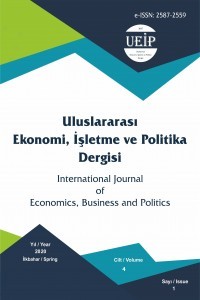A BOOTSTRAP PANEL GRANGER CAUSALITY ANALYSIS OF RELATIONSHIPS BETWEEN POLITICAL INSTABILITY AND MACROECONOMIC VARIABLES / Politik İstikrarsızlık Ve Makroekonomik Değişkenler Arasındaki İlişkilerin Bootstrap Panel Nedensellik Testi İle Analizi
Bu çalışmada Türkiye, Hindistan, Rusya, Meksika ve Endonezya yükselen piyasa ekonomileri için, 1992 ve 2016 dönemleri arasındaki verilerle, panel bootstrap nedensellik testini kullanarak politik istikrarsızlık ve makroekonomik değişkenler arasındaki nedensellik ilişkisini analiz etmek amaçlanmıştır. Seçilmiş makroekonomik değişkenler büyüme, enflasyon ve döviz kurudur. Çalışmanın sonuçları paneldeki ülkeler arasında farklılık gösterip çok fazla nedensellik ilişkisi olmadığını işaret etmesine rağmen, politik istikrarsızlık ve bazı makroekonomik değişkenler arasındaki nedensellik ilişkisinin kanıtlarını sunmaktadır. Çalışmanın ana bulgularını örneklemdeki tüm ülkelere genellemek zor olsa da, beklentilerden farklı olarak makroekonomik değişkenlerin çoğundaki değişikliklerin politik istikrarsızlıktaki değişikliklere neden olduğu sonucuna varabiliriz. Dolayısıyla, elde edilen bulgulara göre, düşük enflasyon, yüksek büyüme ve istikrarlı döviz kuru açısından ekonomik istikrarın sağlanması, politik istikrarın sağlanmasında kilit faktörler olarak görülmektedir.
Anahtar Kelimeler:
Politik İstikrarsızlık, Yatay Kesit Bağımlılığı, Eğim Katsayılarının Homojenliği, Bootstrap Panel Nedensellik Testi
A BOOTSTRAP PANEL GRANGER CAUSALITY ANALYSIS OF RELATIONSHIPS BETWEEN POLITICAL INSTABILITY AND MACROECONOMIC VARIABLES / Politik İstikrarsızlık Ve Makroekonomik Değişkenler Arasındaki İlişkilerin Bootstrap Panel Nedensellik Testi İle Analizi
In this study, we try to analyze the causal relationship between political instability and macroeconomic variables for selected emerging markets such as Turkey, India, Russia, Mexico and Indonesia by using panel bootstrap causality tests over the period of 1992 and 2016. Selected macroeconomic variables are growth, inflation and exchange rate. Even though the results of the study differ across nations in the panel and not indicating to many causal relations, they provide the evidences of causal relations between political instability and some macroeconomic variables. Although it is hard to generalize the major findings of the study to all countries in the sample, still we can conclude that unlike the expectations, changes in most of the macroeconomic variables do cause in changes in political instability. Thus, achieving economic stability in terms of low inflation, high growth and stable exchange rate seem to be key factors to achieve political stability.
Keywords:
Political Instability, Cross-Sectional Dependence, Slope Homogeneity, Bootstrap Panel Granger Causality,
___
- Aisen, A. and Veiga, F. J. (2013). How Does Political Instability Affect Economic Growth?. European Journal of Political Economy, 29, 151-167.
- Alesina, A., Ozler, S., Roubini, N. and Swagel, P. (1996). Political Instability and Economic Growth. Journal of Economic Growth. 1 (2) 189-211.
- Alesina, A., Perotti, R., (1996). Income Distribution, Political Instability, and Investment. European Economic Review. 40, 1203- 1228.
- Arslan, Ü. (2011). Siyasi İstikrarsızlık Ve Ekonomik Performans: Türkiye Örneği. Ege Akademik Bakış Dergisi, 11(1), 73-80.
- Asteriou, D., S. Price, (2001). Political Instability and Economic Growth: UK Time Series Evidence. Scottish Journal of Political Economy, 48(4), 383-399.
- Baltagi, B. H., Feng, Q., and Kao, C. (2012). A Lagrange Multiplier Test For Cross-Sectional Dependence In A Fixed Effects Panel Data Model. Journal of Econometrics, 170(1), 164-177.
- Berthélemy, J., Kauffmann, C., Renard, L. and Wegner, L. (2000). Political Instability, Political Regimes and Economic Performance in African Countries. Draft Paper for African Economic Outlook, Paris.
- Breusch, T., Pagan, A., (1980). The Lagrange Multiplier Test And Its Application To Model Specifications In Econometrics. Rev. Econ. Stud. 47 (1), 239–253.
- Campos, N. F., and Nugent, J. B. (2002). Who Is Afraid Of Political Instability?. Journal of Development Economics, 67(1), 157-172.
- Chen, B., Feng, Y., (1996). Some Political Determinants of Economic Growth: Theory and Empirical Implications. European Journal of Political Economy. 12, 609-627.
- De Haan, J., Siermann, Clemens L. J., (1996). Political Instability, Freedom, and Economic Growth: Some Further Evidence, Economic Development and Cultural Change, 44(2), 339-350.
- Demirgil, H. (2011). Politik İstikrarsızlık, Belirsizlik Ve Makroekonomi: Türkiye Örneği (1970-2006). İktisadi ve İdari Bilimler Dergisi, 31(2), 123-144.
- Devereux, M. B. and Wen, J. (1997). Political Instability, Capital Taxation and Growth. European Economic Review, 42, 1635-1651.
- Edwards, S. and G. Tabellini (1991). Political Instability Political Weakness and Inflation: An Empirical Analysis. NBER Working Paper, 3721, 1–30.
- Feng, Y. (2001). Political Freedom, Political Instability and Policy Uncertainty: A Study of Political Institutions and Private Investment in Developing Countries. International Studies Quarterly, 45, 271–294.
- Jong-a-Pin, R., (2009). On The Measurement of Political Instability and Its Impact on Economic Growth. European Journal of Political Economy, 25, 15–29.
- Khan, S. U., and Saqib, O. F. (2011). Political Instability and Inflation in Pakistan. Journal of Asian Economics, 22(6), 540-549.
- Kirmanoglu, H. (2003). Political Freedom and Economic Well-Being: A Causality Analysis. International Conference on Policy Modelling. Istanbul, Turkey
- Kónya, L., (2006). Exports and Growth: Granger Causality Analysis on OECD Countries with a Panel Data Approach. Econ. Model. 23 (6), 978–992.
- Kuznets, S., S. (1966) Modern Economic Growth: Rate, Structure, and Spread. New Haven:Yale University Press.
- Olson , M. (1982). The Rise and Decline of Nations: Economic Growth, Stagflation and Social Rigidities, New Hawen:Yale University Pres.
- Olson, M. (1991). Autocracy, Democracy, and Prosperity. Strategy and Choice, 131(157), 131-157.
- Pesaran, M.H., (2004). General Diagnostic Tests For Cross Section Dependence In Panels. CESifo Working Paper 1229. IZA Discussion Paper, 1240.
- Pesaran, M.H., (2006). Estimation and Inference in Large Heterogeneous Panel with A Multifactor Error Structure. Econometrica, 74 (4), 967–1012.
- Pesaran, M.H., Ullah, A., Yamagata, T., (2008). A Bias-Adjusted LM Test Of Error Crosssection Independence. Econ. J. 11 (1), 105–127.
- Şanlısoy, S. (2010). Politik İstikrarsızlık-Ekonomik Süreç Politikaları Etkileşimi. Sosyoekonomi, 13(13), 192-214.
- Swamy, P.A.V.B., (1970). Efficient Inference In A Random Coefficient Regression Model. Econometrica, 38 (2), 311–323.
- Telatar, E., Telatar, F., Cavusoglu, T., and Tosun, U. (2010). Political Instability, Political Freedom And Inflation. Applied Economics, 42(30), 3839-3847.
- Zablotsky, Edgardo E.,(1996). Political Stability and Economic Growth. CEMA Working Papers 109, Universidad del CEMA.
- Zureiqat, H., M. (2005). Political Instability and Economic Performance: A Panel Data Analysis. Available at: http://digitalcommons. macalester.edu/ econaward/1.
- Başlangıç: 2017
- Yayıncı: Ali Rıza SANDALCILAR
Sayıdaki Diğer Makaleler
Mahmut KOÇAN, Erol USTAAHMETOĞLU
Seyil NAJIMUDINOVA, Zamira ÖSKÖNBAEVA
Rizal FAHLEFI, Asyari HASAN, Alimin ALIMIN
Anıl LİMAN, Meral ELÇİ, Gülay MURAT
